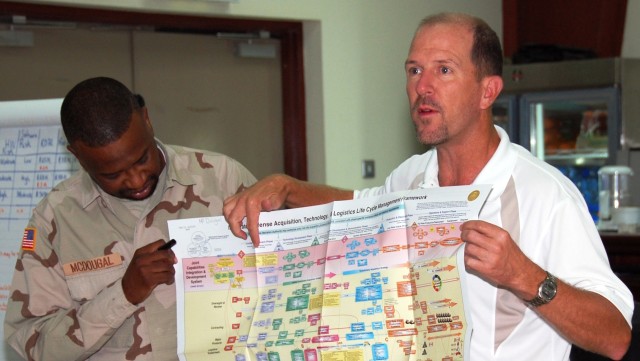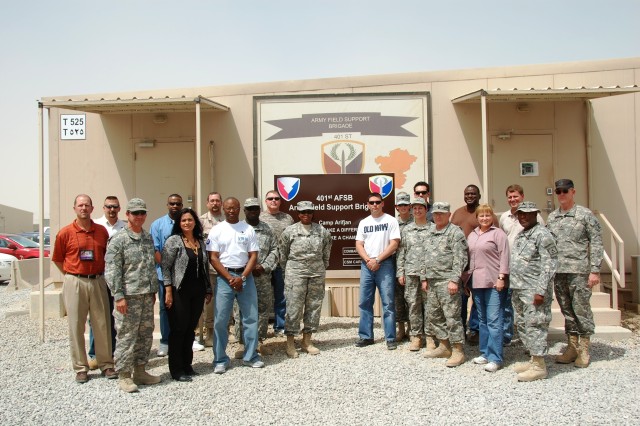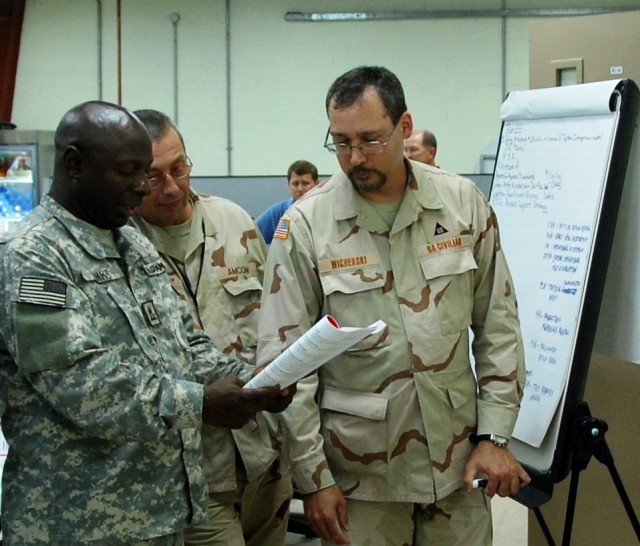CAMP ARIFJAN, Kuwait (Sept. 19, 2008) Ac"a,! Nearly 18 years ago, the U.S. Congress enacted the Defense Acquisition Workforce Improvement Act, a work of landmark legislation intended to improve the effectiveness of the people who manage and implement defense acquisition programs through education, training and work experience.
Here today, for the first time in Southwest Asia, Eighteen Soldiers, Army civilians and contractors completed the classroom portion of the Intermediate Systems Acquisition Course Ac"a,! known in the field as Acquisition 201B Ac"a,! one of the most difficult to obtain requirements for professional certification in the Acquisition, Technology and Logistics field.
"There are waiting lists in the states for this course," said Donald Hafner, 401st Army Field Support Brigade training manager. "For these folks to be able to complete the 201B course here is a real plus."
The week-long course, which has as a pre-requisite some 35 hours of online training, is part of AT&L Workforce Education, Training and Career Development Level II certification in the Program Management and Life Cycle Logistics disciplines, and Level III certification in the Contracting field.
"The complexity of the logistics business makes certification more important than ever," said Hafner. "It's more than just moving parts or supplies - it involves facilities, budgets, acquisition and more; today's logisticians have to be knowledgeable in many areas."
Students traveled in from Afghanistan and Qatar for the training, which is a must for career logisticians.
"Certification really means something," said Jeff Patten, a Professor of Systems Acquisition Management at Defense Acquisition University's South Region Campus, located at Huntsville, Ala. "We have a professional logistics workforce, not just folks doing the best they can - you don't want to have people making multi-million dollar decisions without the proper skill set and knowledge."
According to Patten, one of the real benefits of the professionalization of the AT&L workforce is the ability to more efficiently get critical technology into the hands of the warfighter.
"The MRAP (Mine Resistant Ambush Protected Vehicle) program is a great example," said Patten. "Two years ago, we didn't have them and we have rolled them out quickly in a combat environment."
Patten says training like the Intermediate Systems Acquisition Course has been instrumental in the MRAP and other recent acquisition successes.
"This course is key, we teach students to work in an integrated product team and solve complicated acquisition problems," he said.
One student, who completed the course, says he came to the session looking to develop his logistics skills and prepare for career advancement, but found much more.
"I found the most beneficial part of the course was learning how a defense acquisition strategy plays out, from a need being identified and turned into a concept, and then to a finished product in the hands of the Soldier in the field," said Department of the Army civilian Lewis Courtney, an U.S. Army Aviation and Missile Command Logistics Assistance Representative serving in Kuwait with the 401st Army Field Support Brigade. "The course opened my eyes to other areas in the acquisition, logistics and technology field."
Courtney said the course exceeded his expectations. "The instructors from DAU were great," he said. "Time flew by, and I was never bored."
Bringing Patten and fellow professor Chris Fry in from Huntsville, made economic sense as well, said Hafner.
"The last time we sent someone to the course, the trip was to Germany at a cost of about five thousand dollars," he said.
According to cost figures for this session, the bill came to approximately $37,000 - or just over $2,000 per student, said Hafner.
"The greatest payoff from the training may be the focus it brings to that 'other thing' we do as logisticians," said Robert Williams, 401st AFSB chief of staff and deputy to the brigade commander.
"Acquisition, as are logistics and technology, is one of our core competencies," Williams said. "This is one of the toughest courses to get, and bringing it here gets our folks closer to certification while helping us focus on the 'A' of A, L and T."






Social Sharing